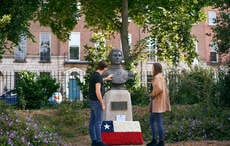Irish professional surfer Dr. Easkey Britton, who has encouraged Iranian women to take to the waves, is breaking down barriers for woman and using her sport for social change.
Britton, born in Donegal to a surfing family, learned to surf when she was just four years old. She describes herself as a “passionate, almost obsessive surfer.”
"Being in the sea is almost like second nature to me. But then, by travelling and getting the opportunity to get out in the world, you realise what a privilege it also is," she said.
Britton first headed to Iran in 2010 with French film maker Marion Poizeau. She was reportedly the first woman to surf in the country.
“Surfing in Iran began as a crazy idea born from a sense of adventure; we wanted to explore somewhere off the beaten track, we didn’t even know if we’d find waves. A group of us were on board initially for our trip in 2010, but it’s logistically so difficult to get there that only Marion Poizeau, a French filmmaker and I arrived. We met for the first time in the airport — our mutual friend missed his flight but we were committed to continue," she told the Irish Examiner.
“I expected a lot more resistance to two women travelling on their own, one with a surfboard the other with a camera, but it intrigued people — they were curious rather than resistant. Our destination, Baluchistan in south-eastern Iran near the Pakistani border, is very traditional, with a pronounced societal gender divide, but once you get over initial barriers you can really connect with people. Iranians are genuinely extremely welcoming, people want you to have a good experience in their country. We were mutually excited about having this insight into a world that we normally never hear about. The information we are fed both in Iran and the West is generally very one-sided.”
Poizeau’s film about their experience went viral online and drew international media attention. Although Britton says she “wasn't on any mission to convert anyone to surfing,” the film also sparked interest with Iranian girls and sportswomen, and in 2013, the pair returned to the country with their “Waves of Freedom” a project, with the aim of teaching women in an impoverished region of Iran to surf.
"There wasn't any surfing scene there at all. So to be able to go and approach the sea with surfboards and it be initiated by women and girls from Iran, in their own country, was something pretty amazing," she said.
“Mona Seraji, an Iranian snowboarder, and Shahla Yasini, an Iranian swimmer joined us for the second trip; they’re pioneering sportswomen in Iran who shared our belief in the power of surfing as a tool to build connection and self-empowerment. Marion documented the story in her new feature documentary Into The Sea which is currently being entered to international film festivals. The story is told by the three of us about introducing the sport to Iran and our experience of surfing there, with challenges like staying covered in 40 degree heat in the sea at the edge of the desert. It’s visually quite impactful, seeing a woman covered at her sport. It’s a challenge but it can certainly be overcome and should not be used as an excuse to stop women doing it. It was fun exploring how to get around the rules and still show respect for customs, even if you don’t agree with them,” says Britton.
“The Iranian women had really pushed for this project and were instrumental to it. It’s important to have local female role models. There was no surfing culture there at all, so everyone experienced it through women initially, which proved inspiring for the young boys and men too, because everyone started surfing.”
Britton earned her PhD in Environment and Society. She has said she plans “to use that experience to fill knowledge gaps in women’s participation in surfing and how NGOs can engage with gender issues. I’m trying to pull it all together.”
Last year, Britton returned to Iran to start the country’s first surf club, open to girls and boys.
“Everything in Iran is quite challenging. We have to get all the equipment there, we’ve been raising funds and we’re looking for support running Waves of Freedom, found online at wavesoffreedom.org, which is already expanding rapidly; it began as a project to empower women in Iran but now we aim to create a global platform.”
Stuff.co.nz reports Britton is also involved with the Pink Nose Revolution in Papua New Guinea, which started with surfing and then expanded.
"The men and the boys would take the boards and the women wouldn't be able to go surf," she said.
The Surfing Association of Papua New Guinea decided to paint the noses of half the boards pink to show they were for women.
"In a way it seems something really, really simple, but it's shifted attitudes and behaviours."




Comments